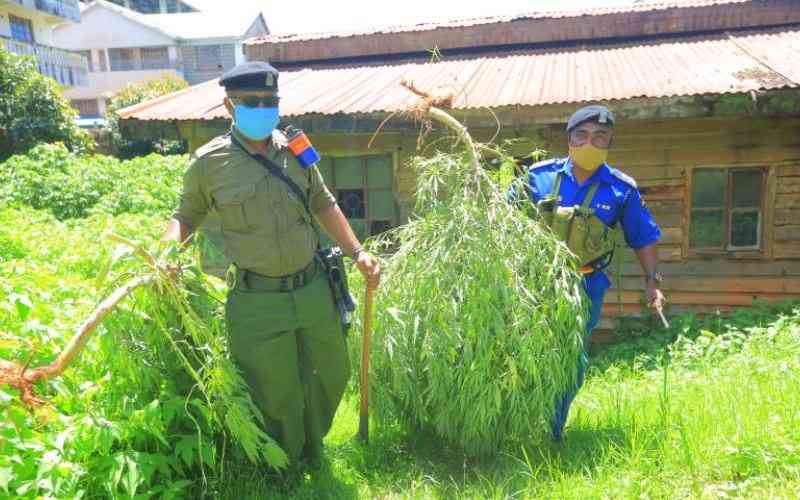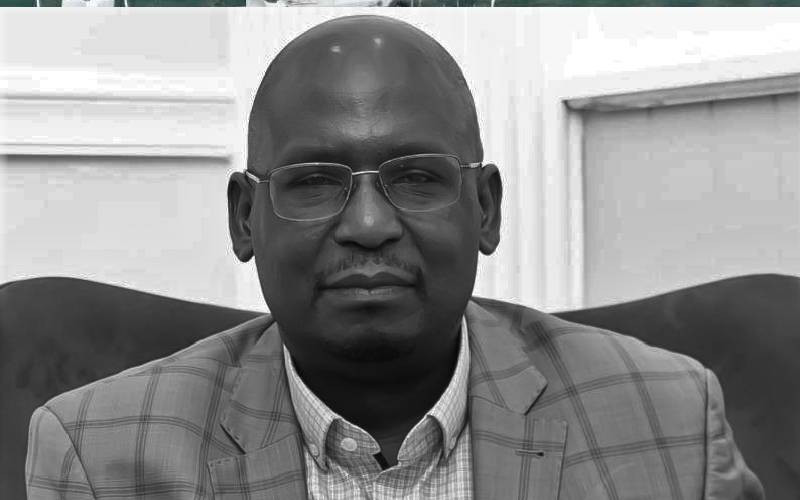
Cannabis Sativa is a plant that has been the subject of heated debates for many years. This green plant, which you might be forgiven for thinking is just a garden vegetable, packs a lot of history.
It has been christened with many names, including the “holy” herb, but it has also been blamed as the root of many evils. What is it about this green plant that has made it illegal in so many nations? Why has talking about it been considered taboo for decades, with its name only mentioned in whispers?
One in every 53 Kenyans aged 15 – 65 years (518,807) is currently using cannabis.
Apart from causing confusion, experts say the plant can be used to relieve severe pain and for cosmetic reasons, such as creating body oils. There is a group of substances found in the cannabis plant called cannabinoids. The main cannabinoids are tetrahydrocannabinol (THC) and cannabidiol (CBD). However, it is believed that there are more than 100 cannabinoids. CBD is mostly used as a painkiller.
Toxicologist Prof. James Mbaria says that apart from bhang being the most widely used illegal drug, it has medicinal value. Like most species, cannabis sativa has two genders: female and male.
“The female, which has flowers and hairy substances, is the source of the medicine. The male one is less concentrated. The main chemical of concern is known as THC (tetrahydrocannabinol), and that is what affects the brain. But there is another chemical called CBD (cannabidiol). CBD has medicinal value and does not affect the brain,” he says. Prof. Mbaria adds that cannabis sativa is similar to a factory that produces different chemicals.
“People have used it more for recreation than for medicine, and when used for recreation, it has damage to the brain. But that does not mean that it has no more value because many other chemicals in that plant have medicinal values,” he says.
Henry Kamagy, a Kenyan vet living in the US, grew up believing that once you start consuming cannabis, that is the end of your focus in life. However, after growing older and getting the needed exposure, he was able to learn more about the plant, and in 2017, his life changed after an injury that paralyzed him from the waist down.
- Nacada acting CEO expresses concern over cannabis use
- US might change how it classifies marijuana
- Is medical cannabis already legal in Kenya?
Keep Reading
“I was operating on a horse. I was with a student who miscalculated the anesthesia dosage, so the horse woke up during the process and kicked me hard, and I got hurt,” he says.

In 2019, he finally had his surgery. However, the pain was overwhelming.
“I consulted my doctor about the pain, and he told me about cannabidiol. He explained they are extracts from cannabis that would help with the pain,” he says.
The CBD eased his pain tenfold.
“I use it once the pain is too severe. CBD comes in different types: Ointments, candy. What I use is in the form of candy. Once taken, the pain eases within 10 minutes. The amount taken depends on the level of the pain,” he says.
Dr. Kamagy says before purchasing CBD, the doctor should prescribe the amount to be taken.
Commercial Control?
Researcher and author Gwada Ogot say that the cannabis ban was for commercial control. In 2025, Gwada called for its legalization and the need to regulate and tax the cannabis industry. Later, he took the first petition to Parliament in 2017, pushing for the legalization of cannabis. Hemp, also extracted from cannabis, is used to make military uniforms, canvas for military vehicles, and the rope used to anchor ships. It is the toughest fibre.
“If you use the hemp product for newspaper production, it produces paper that is stronger than tree paper. It is way cheaper because it takes 3-6 months to grow while a tree takes longer. One of the people who promoted its ban was Randolph Hearst, who controlled the newspaper industry in America at that time. It is all a commercial conspiracy that benefited them greatly,” says Gwada. Hearst’s empire used yellow journalism, which he pioneered to demonize the cannabis plant and spread a public perception that there were connections between cannabis and violent crime.
Experts argued that hemp became a very cheap substitute for the wood pulp that was used in the newspaper industry. However, Hearst’s newspapers owed large debts to Canadian suppliers of paper, who used wood as raw material. If an alternative raw material for paper had emerged, it would have lowered the price of the paper needed to print Hearst’s many newspapers.
“In Kenya, there’s the political fear that if so and so is given credit for legalizing marijuana, it will give him political mileage. Also, the issue of morality. The issues about insanity are just propaganda. It’s a commercial war,” he says.
Gwada says that legalizing cannabis will increase urban-to-rural migration as opposed to rural-to-urban migration.
“This is a suspected position. One of the fears of the government is to legalize a plant that would transform the economy. The rural-to-urban migration would stop. Because a small piece of land would be able to give you value in the rural area. You would have no business coming to earn Sh50,000 in the city while a quarter acre will make you Sh150,000 in the rural area,” says Gwada.
Gwada adds that the economic transformation is that once the rural lands are valuable, then there will be a balanced economy by reducing the gap between the rich and the poor and creating job opportunities.
Effects on the Brain
Dr. Khalif Abdifatah, a Consultant Neurosurgeon at Nairobi West Hospital, says THC binds to cannabinoid receptors in the brain, particularly CB1 receptors. This interaction alters neurotransmitter release, affecting mood, memory, concentration, and perception.
“Short-term effects may include euphoria, relaxation, altered senses, impaired memory, and distorted time perception. People feel more focused and relaxed immediately after consuming cannabis,” says Dr. Khalif. The duration of cannabis effects depends on various factors, including the method of consumption, potency, and individual tolerance. Smoking or vaporizing typically leads to a quicker onset and shorter duration while edibles may have a delayed onset and last longer.
For instance, the effect is felt one minute after smoking and lasts for 3-4 hours. When consumed as a cake or biscuit, the effect is felt after 30 minutes and lasts 6-8 hours.
“The risk of cannabis addiction increases with regular use. Factors influencing addiction include the frequency and quantity of use, potency of the cannabis product, age of onset, genetics, and underlying mental health conditions,” he says.
About long-term effects, Dr. Khalif says prolonged use may impact cognitive function, especially in areas of learning, memory, and attention. Chronic smoking can lead to respiratory issues.
“There’s evidence suggesting a potential link between long-term cannabis use and mental health disorders, particularly in individuals predisposed to conditions like anxiety, depression, or psychosis. However, the exact nature of the relationship between cannabis use and mental health is a chicken and egg scenario,” says Dr. Khalif. Cannabis use is becoming more common and is now the third most commonly used drug after alcohol and tobacco.
The Law on Cannabis
Lawyer Shadrack Wambui, the chairman of Sheria Mtaani, states that in Kenya, cannabis is regulated under the Narcotic Drugs and Psychotropic Substances Act of 1994.
The law prescribes various penalties for offenders. For instance, those found smoking face lesser charges than those found trafficking the drug.
“Someone found smoking will not receive more than 5 years or a fine exceeding Ksh. 100,000. However, someone trafficking or planting the drug will face a harsh penalty. If found guilty of cannabis farming, the land in question will be forfeited to the state,” he says.
Although cannabis usage is illegal, there are exceptions, and individuals may not be charged if found in possession of it.
“Someone who possesses a prescription from a doctor and medical researchers will not face charges if found in possession of the herb,” he says.
Religious perspectives on cannabis
Wambua Mwendwa, a member of The Rastafarian Society of Kenya, explains that cannabis helps them thrive spiritually.
“We use the plant as a sacrament during our services. Since time immemorial, the plant has been utilized for medicinal purposes and also to create robust military uniforms, canvases, soap, oils, and quality jeans,” he says.
Rastafarians believe that the use of cannabis induces a meditative state and brings them closer to the divine.
 The Standard Group Plc is a multi-media organization with investments in media platforms spanning newspaper print
operations, television, radio broadcasting, digital and online services. The Standard Group is recognized as a
leading multi-media house in Kenya with a key influence in matters of national and international interest.
The Standard Group Plc is a multi-media organization with investments in media platforms spanning newspaper print
operations, television, radio broadcasting, digital and online services. The Standard Group is recognized as a
leading multi-media house in Kenya with a key influence in matters of national and international interest.











